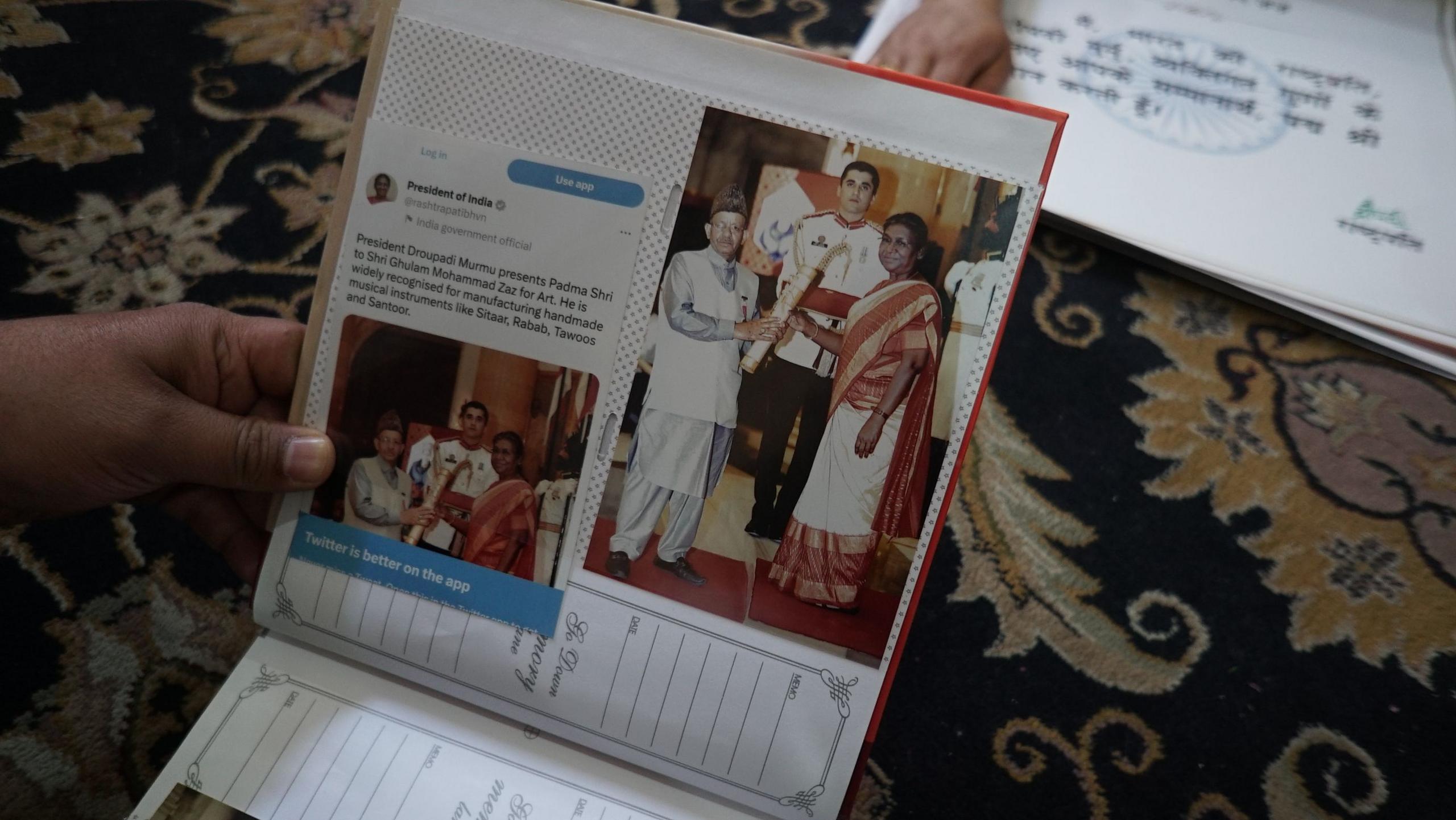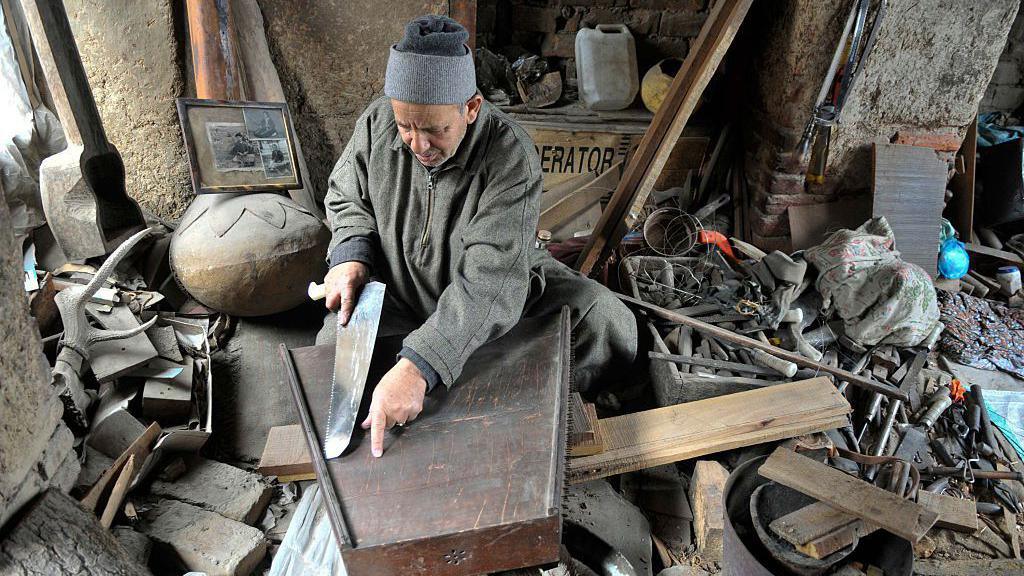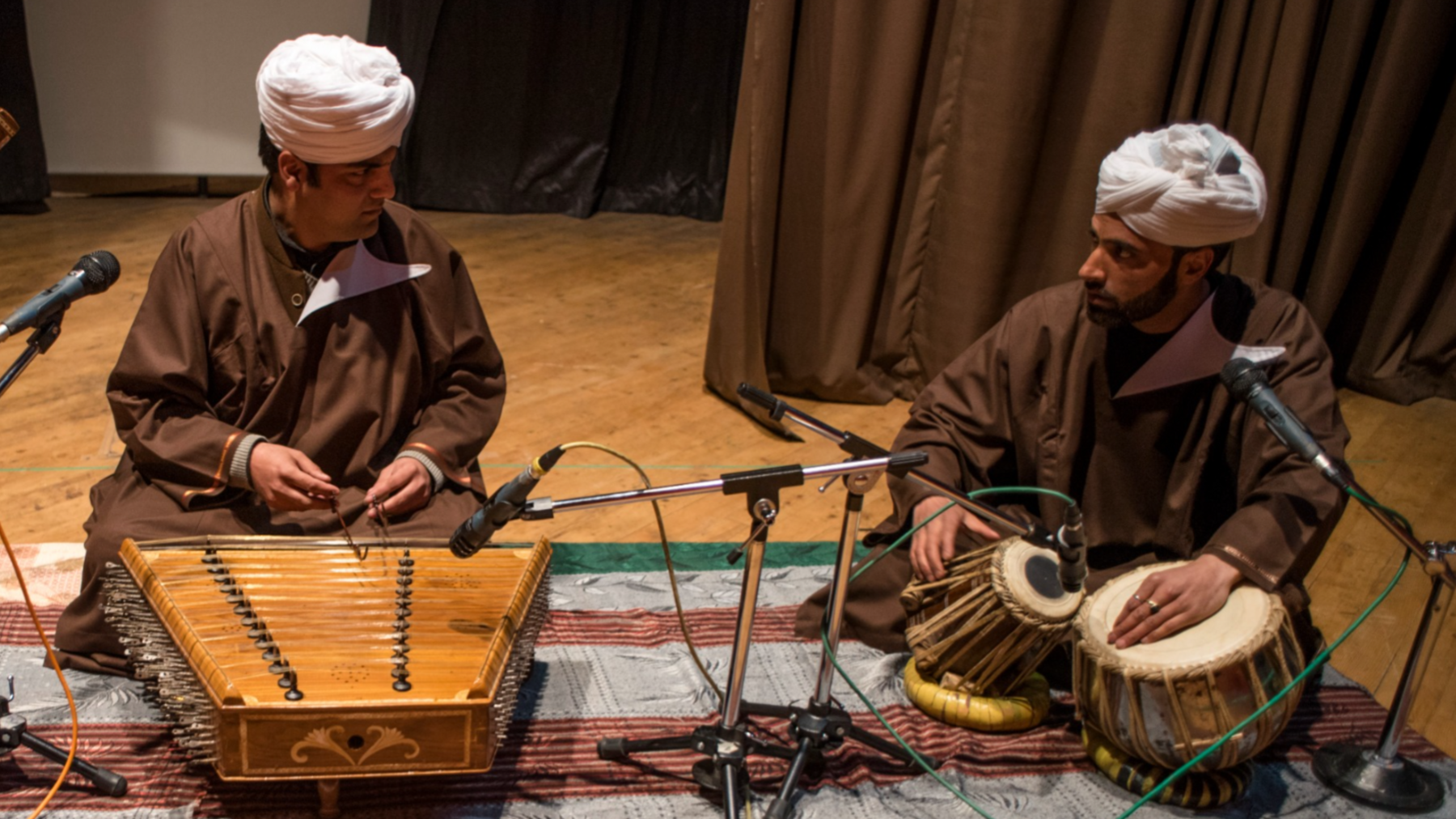The last custodian: A Kashmiri artisan's battle to save a musical legacy

Ghulam Mohammed Zaz is Kashmir's last traditional hand maker of the santoor instrument
- Published
In the quiet, narrow lanes of Srinagar in Indian-administered Kashmir, a small, dimly lit workshop stands as one of the last holdouts of a vanishing craft.
Inside the shop sits Ghulam Mohammed Zaz, who is widely believed to be the region's last artisan who can make the santoor by hand.
Santoor is a trapezoid-shaped stringed musical instrument, similar to a dulcimer, which is played with mallets. It is known for its crystalline bell-like tone and has been Kashmir's musical signature for centuries.
Mr Ghulam Mohammed belongs to a lineage of craftsmen who have been building string instruments in Kashmir for over seven generations. The Zaz family name has long been synonymous as the makers of the santoor, rabab, sarangi and sehtar.
But in recent years, the demand for handcrafted instruments has dwindled, replaced by machine-made versions that are cheaper and quicker to produce. At the same time, music tastes have changed, adding to the decline.
"With hip hop, rap, and electronic music now dominating Kashmir's soundscape, younger generations no longer connect with the depth or discipline of traditional music," says Shabir Ahmad Mir, a music teacher. As a result, demand for the santoor has collapsed, leaving craftsmen without apprentices or a sustainable market, he adds.

Mr Ghulam Mohammed received India's fourth highest civil honour in 2022
In his century-old shop, Mr Ghulam Mohammed sits beside a hollow block of wood and worn iron tools - the quiet remnants of a fading tradition.
"There is no one left [to continue the craft]," he says. "I am the last."
But it wasn't always this way.
Over the years, renowned Sufi and folk artists have played santoors handcrafted by Mr Ghulam Mohammed.
A photo in his shop shows maestros Pandit Shiv Kumar Sharma and Bhajan Sopori performing with his instruments.
Believed to have originated in Persia, the santoor reached India in the 13th or 14th century, spreading through Central Asia and the Middle East. In Kashmir, it took on a distinct identity, becoming central to Sufi poetry and folk traditions.
"Originally part of Sufiana Mausiqi (an ensemble music tradition), the santoor had a soft, folk-like tone," says Mr Mir.
Pandit Shiv Kumar Sharma later adapted it for Indian classical music, he says, by adding strings, redesigning bridges for richer resonance and introducing new playing techniques.
Bhajan Sopori, who has Kashmiri roots, "deepened its tonal range and infused it with Sufi expression", adds Mr Mir, helping cement the santoor's place in Indian classical music.
Another photo shows Mr Ghulam Mohammed receiving the Padma Shri from President Droupadi Murmu in 2022, honoured for his craftsmanship with India's fourth-highest civilian award.

Mr Ghulam Mohammed crafting a traditional santoor
Mr Ghulam Mohammed was born in the 1940s in Zaina Kadal, a neighbourhood named after an iconic bridge that once served as the lifeline of commerce and culture in Kashmir. Growing up, he was surrounded by the sounds and tools of his family's trade.
Health issues forced him to leave formal education at an early age and that is when he began learning the art of santoor-making from his father and grandfather - both master craftsmen themselves.
"They taught me not just how to make an instrument but how to listen - to the wood, the air and the hands that would play it," he said.
"My ancestors used to be summoned by the courts of local kings and were often asked to build instruments that could soothe hearts," he says.
In his workshop, a wooden bench lined with chisels and strings lies beside the skeletal frame of an unfinished santoor. The air smells faintly of aged walnut wood, but there is no machinery in sight.
Mr Ghulam Mohammed believes machine-made instruments lack the warmth and depth of those crafted by hand and the audio quality comes nowhere close.
Making a santoor is a slow, deliberate process, the craftsman says. It starts with selecting the right wood, aged and seasoned for at least five years. The body is then carved and hollowed for optimal resonance, and each of the 25 bridges is precisely shaped and placed.
Over 100 strings are added, followed by the painstaking tuning process, which can take weeks or even months.
"It is the craft of patience and perseverance," he says.

The santoor has been Kashmir's musical signature for decades
In recent years, social media influencers have visited Mr Ghulam Mohammed's workshop, sharing its story online. He appreciates the attention but says it hasn't led to real efforts to preserve the craft or its legacy.
"These are good people," he says, "but what will become of this place when I am gone?"
With his three daughters pursuing other careers, there's no one in the family to carry on his work. Over the years, he's had offers - government grants, promises of apprentices, even suggestions from the state handicrafts department.
But Mr Ghulam Mohammed says he's "not looking for fame or charity". What he truly wants is someone to carry the art forward.
Now in his eighties, he often spends hours beside an unfinished santoor, listening to the silence of what's yet to be completed.
"This is not just woodwork," he says.
"It is poetry. A language. A tongue I give to the instrument.
"I hear the santoor before it plays. That is the secret. That is what must be passed on," he adds.
As the world outside embraces modernity, Mr Ghulam Mohammed's workshop remains untouched by time - slow, silent and filled with the scent of walnut and memory.
"Wood and music," he says, "both die if you don't give them time."
"I want someone who truly loves the craft to take it forward. Not for the money, not for the cameras, but for the music."
Follow BBC News India on Instagram, external, YouTube,, external Twitter, external and Facebook, external.